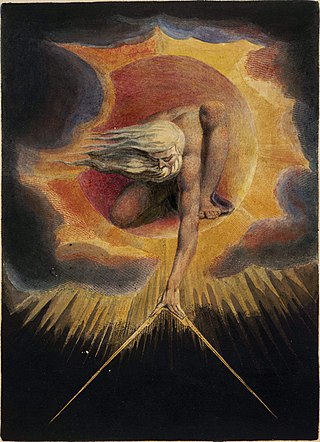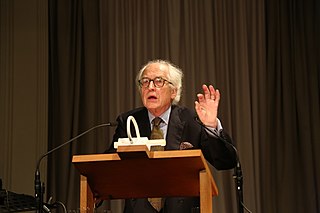
Kim Stanley Robinson is an American writer of science fiction. He has published 22 novels and numerous short stories and is best known for his Mars trilogy. His work has been translated into 24 languages. Many of his novels and stories have ecological, cultural, and political themes and feature scientists as heroes. Robinson has won numerous awards, including the Hugo Award for Best Novel, the Nebula Award for Best Novel and the World Fantasy Award. The Atlantic has called Robinson's work "the gold standard of realistic, and highly literary, science-fiction writing." According to an article in The New Yorker, Robinson is "generally acknowledged as one of the greatest living science-fiction writers."

Mars, the fourth planet from the Sun, has appeared as a setting in works of fiction since at least the mid-1600s. Trends in the planet's portrayal have largely been influenced by advances in planetary science. It became the most popular celestial object in fiction in the late 1800s when it became clear that there was no life on the Moon. The predominant genre depicting Mars at the time was utopian fiction. Around the same time, the mistaken belief that there are canals on Mars emerged and made its way into fiction, popularized by Percival Lowell's speculations of an ancient civilization having constructed them. The War of the Worlds, H. G. Wells's novel about an alien invasion of Earth by sinister Martians, was published in 1897 and went on to have a major influence on the science fiction genre.

In the mythology of William Blake, Urizen is the embodiment of conventional reason and law. He is usually depicted as a bearded old man; he sometimes bears architect's tools, to create and constrain the universe; or nets, with which he ensnares people in webs of law and conventional society. Originally, Urizen represented one half of a two-part system, with him representing reason and Los, his opposition, representing imagination. In Blake's reworking of his mythic system, Urizen is one of the four Zoas that result from the division of the primordial man, Albion, and he continues to represent reason. He has an Emanation, or paired female equivalent, Ahania, who stands for Pleasure. In Blake's myth, Urizen is joined by many daughters with three representing aspects of the body. He is also joined by many sons, with four representing the four elements. These sons join in rebellion against their father but are later united in the Last Judgment. In many of Blake's books, Urizen is seen with four books that represent the various laws that he places upon humanity.

The history of the Ottoman Empire in the 18th century has classically been described as one of stagnation and reform. In analogy with 18th-century France, it is also known as the Ancien Régime or Old Regime, contrasting with the "New Regime" of the Nizam-i Cedid and Tanzimat in the 19th century.
Helen Watanabe-O'Kelly is an Irish Germanist and Founder of WiGS.
Science fiction studies is the common name for the academic discipline that studies and researches the history, culture, and works of science fiction and, more broadly, speculative fiction.

John Charles Barrell FBA FEA is a British scholar of eighteenth and early nineteenth century studies.
Daniel R. Schwarz is Frederick J. Whiton Professor of English Literature and Stephen H. Weiss Presidential Fellow at Cornell University in the United States where he has taught since 1968. He is the author of eighteen significant books and numerous articles, many of which have appeared in prestigious journals and collections of essays. His recent book is Endtimes? Crises and Turmoil at the New York Times: 1999-2009 (2012) speaks to both scholarly and general audiences. He has directed nine NEH seminars and has lectured widely in the United States and abroad, including a number of lecture tours under the auspices of the academic programs of the USIS and the State Department. He was a founding member of the Society for the Study of Narrative Literature and served as its President from 1990 to 1991. He has held three endowed visiting professorships. He was a guest Fellow for short periods at Oxford (Brasenose) and Cambridge (Girton) in the UK. He has been the President of the Cornell Phi Beta Kappa chapter since 2009.

John Dixon Hunt is an English landscape historian whose academic career began with teaching English literature. He became a professor at the University of Pennsylvania in 1994 and served as the department chair of landscape architecture and regional planning until June 2000, now being emeritus. One aspect of his work focuses on the time between the turn of the seventeenth through the end of the 18th centuries in France and England. He is the author of many articles, not only in landscape journals but also Apollo, Lincoln Center Theater Review, and Comparative Criticism, and chapters on topics including T. S. Eliot and modern painting, Utopia in and as garden, and garden as commemoration.

Louis Reichenthal Gottschalk was an American historian, an expert on Lafayette and the French Revolution. He taught for many years at the University of Chicago, where he was the Gustavus F. and Ann M. Swift Distinguished Service Professor of History.

The War of the Worlds is a science fiction novel by English author H. G. Wells. It was written between 1895 and 1897, and serialised in Pearson's Magazine in the UK and Cosmopolitan magazine in the US in 1897. The full novel was first published in hardcover in 1898 by William Heinemann. The War of the Worlds is one of the earliest stories to detail a conflict between humankind and an extraterrestrial race. The novel is the first-person narrative of an unnamed protagonist in Surrey and his younger brother in London as southern England is invaded by Martians and is one of the most commented-on works in the science fiction canon.
Richard Arthur Grusin is an American new media scholar and author. Grusin is a Professor of English at the University of Wisconsin–Milwaukee, and former Director of the Center for 21st Century Studies.
Srinivas Aravamudan was an Indian-born American academic. He was a professor of English, Literature, and Romance Studies at Duke University, where he also served as dean of the humanities. He was widely recognized for his work on eighteenth-century British and French literature and postcolonial literature and theory. His publications included books and articles on novels, slavery, abolition, secularism, cosmopolitanism, globalization, climate change, and the anthropocene.

Scottish education in the eighteenth century concerns all forms of education, including schools, universities and informal instruction, in Scotland in the eighteenth century.
William Rea Keast was an American scholar and academic administrator who served as president of Wayne State University from 1965 to 1971.

Frank E. Sysyn is an American historian of Ukrainian origin. His grandmother was from Ukraine.

The Ottoman decline thesis or Ottoman decline paradigm is an obsolete historical narrative which once played a dominant role in the study of the history of the Ottoman Empire. According to the decline thesis, following a golden age associated with the reign of Sultan Suleiman the Magnificent, the empire gradually entered into a period of all-encompassing stagnation and decline from which it was never able to recover, lasting until the dissolution of the Ottoman Empire in 1923. This thesis was used throughout most of the twentieth century as the basis of both Western and Republican Turkish understanding of Ottoman history. However, by 1978, historians had begun to reexamine the fundamental assumptions of the decline thesis.
Margaret Jacob is an American historian of science and Distinguished Professor of Research at UCLA. She specializes in the history of science, knowledge, the Enlightenment and Freemasonry.
The Gottschalk Prize is awarded for an outstanding historical or critical study on the 18th century and carries a prize of US$1,000. It is named in honour of Louis Gottschalk (1899–1975), second President of the American Society for Eighteenth-Century Studies (ASECS), President of the American Historical Association, and for many years Distinguished Service Professor at the University of Chicago. His scholarship exemplified the humanistic ideals that this award is meant to encourage.










